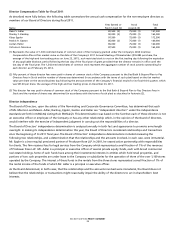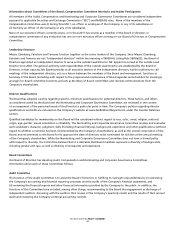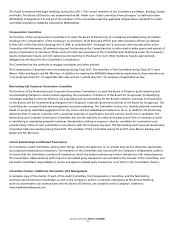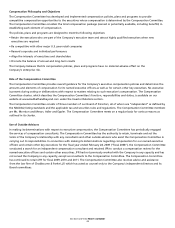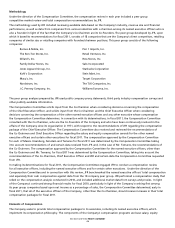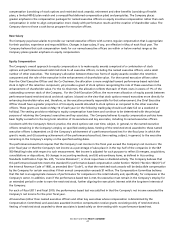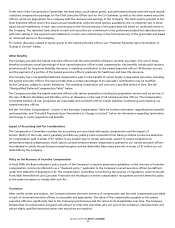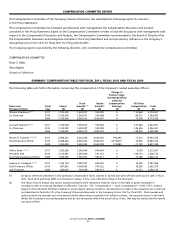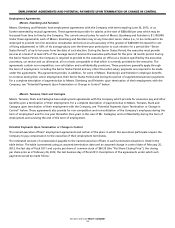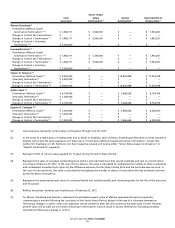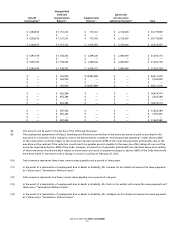Bed, Bath and Beyond 2011 Annual Report Download - page 49
Download and view the complete annual report
Please find page 49 of the 2011 Bed, Bath and Beyond annual report below. You can navigate through the pages in the report by either clicking on the pages listed below, or by using the keyword search tool below to find specific information within the annual report.BED BATH & BEYOND PROXY STATEMENT
47
compensation (consisting of stock options and restricted stock awards), retirement and other benefits (consisting of health
plans, a limited 401(k) plan match and a nonqualified deferred compensation plan) and perquisites. The Company places
greater emphasis in the compensation packages for named executive officers on equity incentive compensation rather than cash
compensation in order to align compensation more closely with performance results and the creation of shareholder value. The
Company does not have a cash bonus program for executive officers.
Base Salary
The Company pays base salaries to provide our named executive officers with current, regular compensation that is appropriate
for their position, experience and responsibilities. Changes in base salary, if any, are effective in May of each fiscal year. The
Company believes that cash compensation levels for our named executive officers are within or below market range as the
Company places greater emphasis on equity compensation.
Equity Compensation
The Company’s overall approach to equity compensation is to make equity awards comprised of a combination of stock
options and performance-based restricted stock to all executive officers, including the named executive officers, and a small
number of other executives. The Company’s allocation between these two forms of equity awards considers the retention
component and the role of the executive in the enhancement of shareholder value. For the named executive officers other
than the Chief Executive Officer and the Co-Chairmen, the allocation is more weighted toward performance-based restricted
stock in light of this retention component, yet provides a grant of stock options recognizing the role of these executives in the
enhancement of shareholder value. For the Co-Chairmen, the allocation reflects that each of them owns in excess of 1% of the
outstanding common stock of the Company. For the Chief Executive Officer, the more even allocation of equity awards between
performance-based restricted stock and stock options is based on the view that stock options reward executives more directly for
enhancing shareholder value and, therefore, as the executive primarily responsible for that enhancement, the Chief Executive
Officer should have a greater proportion of his equity awards allocated to stock options as compared to the other executive
officers. These grants are made on May 10 of each year (or the following trading day should such date fall on a weekend or
holiday). The vesting provisions relating to equity compensation have been and continue to be determined with the principal
purpose of retaining the Company’s executives and key associates. The Company believes its equity compensation policies have
been highly successful in the long term retention of its executives and key associates, including its named executive officers.
Consistent with the Company’s historic practice, the stock options vest over time, subject, in general, to the named executive
officers remaining in the Company’s employ on specified vesting dates. Vesting of the restricted stock awarded to these named
executive officers is dependent on (i) the Company’s achievement of a performance-based test for the fiscal year in which the
grant is made, and (ii) assuming achievement of the performance-based test, time vesting, subject, in general, to the executive
remaining in the Company’s employ on the specified vesting dates.
The performance-based test requires that the Company’s net income in the fiscal year exceed the Company’s net income in the
prior fiscal year or that the Company’s net income as a percentage of sales place it in the top half of the companies in the S&P
500 Retailing Index with respect to such measurement. Net income is adjusted for such purpose to reflect (i) mergers, acquisitions,
consolidations or dispositions, (ii) changes in accounting methods, and (iii) extraordinary items, as defined in Accounting
Standards Codification Topic No. 225, “Income Statement”, or stock repurchase or dividend activity. The Company believes that
this performance-based test meets the standard for performance-based compensation under Section 162(m) (“Section 162(m)”) of
the Internal Revenue Code of 1986, as amended (the “Code”), so that the restricted stock awards will be deductible compensation
by the Company for certain executives if their annual compensation exceeds $1 million. The Compensation Committee believes
that this test is an appropriate measure of performance for companies in the retail industry and, specifically, for companies in the
Company’s sector. In addition, even if the performance-based test is met, the executive must remain in the Company’s employ for
an extended period in order to earn the restricted stock, further aligning the executive’s interest with the long-term interests of
the Company.
For each of fiscal 2011 and fiscal 2010, the performance-based test was satisfied in that the Company’s net income exceeded the
Company’s net income for the prior fiscal year.
All executives (other than named executive officers and other key executives whose compensation is determined by the
Compensation Committee) and associates awarded incentive compensation receive grants consisting solely of restricted stock.
Vesting of restricted stock awarded to these associates is based solely on time-vesting with no performance-based test.




